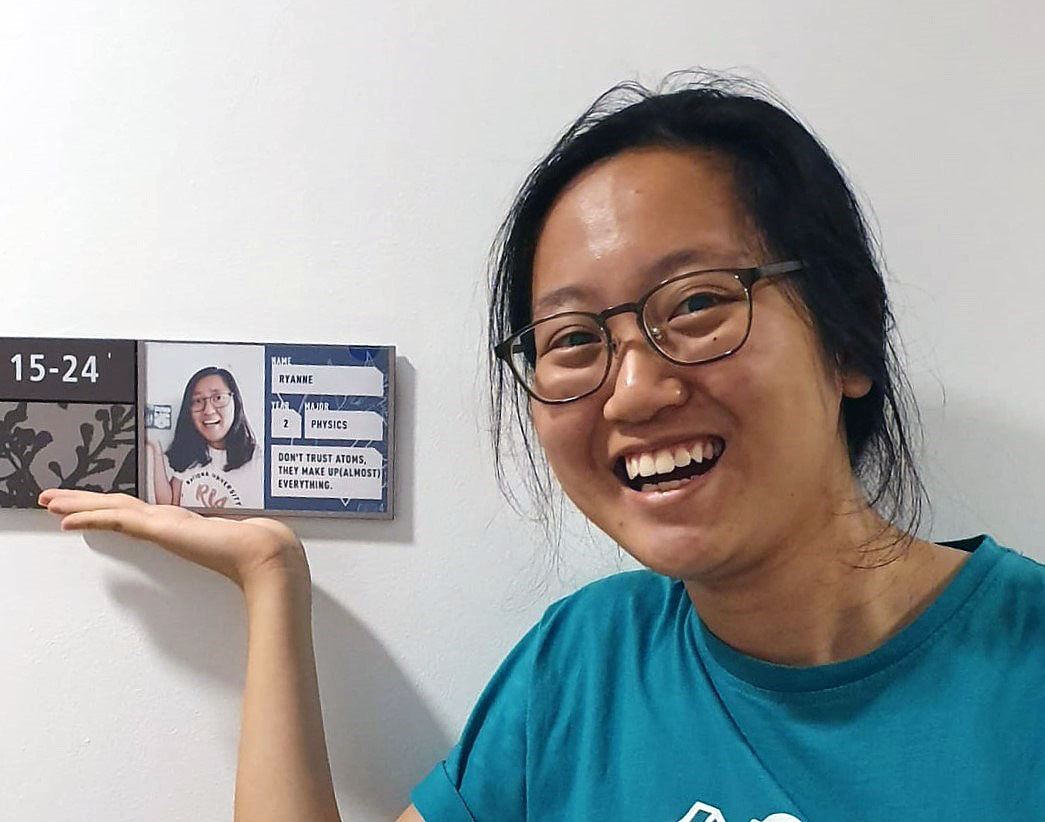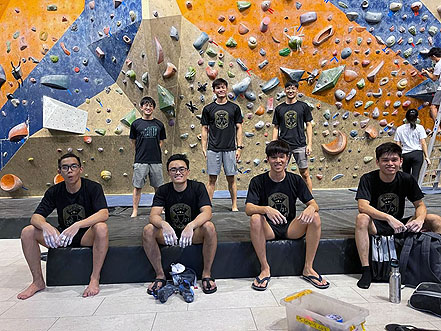Campus Living in a Time of COVID-19

The pandemic has reshaped the way we think about life in RC4, for the better
By Ryanne Ang
Time flies, as they say, when you are having fun. It is no wonder why, for many students in Residential College 4, the two years of on-campus living are the most fleeting, and the most precious in our university lives. There is no other time in life when we are as young, have as much energy, and can be as immersed in an array of activities within a lively community, inside an environment brimming with opportunities. Perhaps that was also why, when Covid-19 struck, many of us felt the loss of vibrancy to undergraduate life even more keenly. Yet, in the midst of carrying on with learning – while relearning how to lead our lives – the way we viewed life in RC4 changed along the way.
My final semester in RC4 and as a Year 2 student coincided with the onset of the pandemic, two years ago. From the experiences of seniors before me, it seemed as though my time in the College was supposed to end on a high note. And there was much to anticipate: my band’s slated performance during the annual Arts Night, as well as the imminent launch of a makerspace workshop by my technology interest group. All this changed when Singapore entered a “circuit breaker” in April 2020, a partial lockdown imposed to stem the rising tide of Covid-19 cases in the country. Lectures were shifted online, while gatherings and activities were postponed indefinitely. Routines of both student and human life were upended as everyone was forced to adapt to living life at a distance from one another. Like me, Noe Noe Su Aung, Nouline, presently a Year 3 Business Administration and Real Estate Finance double major, was thrown by the pandemic.

Since entering the College, Nouline had been keenly involved in various activities: playing for the RC4 volleyball team, participating in the STEER Himalaya project and competitively golfing for the University. However, the circuit breaker resulted in the delay of the follow up of the STEER Himalaya project, along with her having to both move out of the College at the end of her first year and call a time-out on her sporting pursuits. Being cooped up at home and unable to expend her energy on the volleyball court or golf course allowed Nouline to discover a side to her she had never seen before. “I’m a person that can’t stay still for very long,” said Nouline with a grin. After finding success from an initial attempt to satisfy her cravings for her favourite banana cake, Nouline started baking every day. “My sister asked: Why not create an Instagram account and just document whatever you bake? I thought, okay sure, let's do that,” said Nouline.
Soon, Nouline’s daily feed of insta-worthy bakes became a hit among her social media followers. As her original banana cakes evolved to include different ingredients, from dollops of Nutella, to touches of zucchini, Nouline’s friends began begging her to let them try her tasty treats. Encouraged by the popularity of her fare, Nouline was further convinced to fulfil more orders – and so, a small business was born out of what was meant to be a pandemic pastime.
When the new academic year swung round in August 2020, the Covid-19 situation had improved to some extent. The pace of work – as a newly-minted Year 3 student then – as well as having to come to terms with living with the pandemic meant I did not have much time to dwell on the lack of proper closure to the end of my time in RC4. Still, I wondered how the rest of the community was coping with the changes, in terms of new beginnings for Year 1 residents, and transitional endings for the Year 2s.
As a Year 2 senior then, Nouline stepped up to be a group leader for Aquila House in RC4’s annual freshman orientation programme – which, for the first time in history, was held virtually. Nicholas Ang, who was a Year 1 freshman then, was a member of Nouline’s orientation group. Even with the loosening of some safe management measures, the start of Nicholas’ university life was discouraging because of the feelings of isolation. He could only meet most of his RC4 peers virtually, as all residents were housed by faculty in the first semester. Worse still – as an Engineering Science student, there were no seniors from his faculty in Aquila House who could guide him on the ins-and-outs of his course. “We were very limited by the five-person limit (on meetings) in the first semester,” said Nicholas, who is presently a Year 2 student. “And for the Year 1 engineering students of Aquila, we only had each other.”

It was not easy, added Nicholas, to break the ice with RC4 residents he did not know; both environment and experience were foreign to all, and everyone felt lost. So the sense of comfort the second semester of academic year 2020/2021 brought to Nicholas and his pals was more than welcome. With the separation by faculties lifted and the houses reunited, Nicholas soon started to feel the “community vibes”. “It was quite a big jump in a sense,” explained Nicholas. “Among the Year 1s, we didn’t know each other so well, being split from the start by faculty.”
“The seniors were very eager to welcome us; they took the initiative to get everyone to know each other bit by bit, which would be very hard for any Year 1 student to do (on their own)!” One of the ways this took place was through communal meals during breakfast and dinner. Before the pandemic, meals among RC4 students were simply that – a time to eat. Since the pandemic, meals have become invaluable pockets of time for people to bond. “Dinner is the best,” said Nicholas. “It's the time where everyone is usually done with the day; it’s the time everyone is free for each other.” Among his mates, a fixed time of 6pm was agreed on, and whoever was free would go down to the dining hall, albeit in small groups, in keeping with safe-distancing measures.
While the pandemic had its encumbrances and annoyances, I wonder if there were plus points too. Having a keener realisation about the transience of RC4 life has motivated me to make each interaction with my peers more intentional, while having a deeper appreciation for the time spent together. For Nicholas, the experience opened his eyes to how much of the everyday he had glossed over. “In the moment, we will treat the time spent with each other as normal,” said Nicholas. “When life goes on and we do not see them (as) often anymore, then we realise that each of those normal moments is special.”
For Nouline, staying on campus was something she felt had been taken for granted; she recounts simple surprises, such as opening her room door in the morning and finding a packet of breakfast, in a plastic bag, hanging on the door handle, courtesy of her next-door neighbour. Most importantly, she treasures the opportunities for making friends, considering how “we don’t know how they might be important to you later on, through your career, life, even in the future. You make a lot of life-long friendships without knowing.” I suppose this is something on which all of us – Nouline, Nicholas and I – can concur: there is much to celebrate about the amazing aspects of RC4 living.
Would it be better then, if we could stay in RC4 for all four years of our undergraduate life? Nicholas pauses to ponder this, then says, “I think it's a good thing that there's this break after two years. Then, I suppose we realise, indeed we miss our RC4 friends who we used to see everyday.”
Ryanne is a Year 4 Physics major in NUS and an alumnus of RC4.


